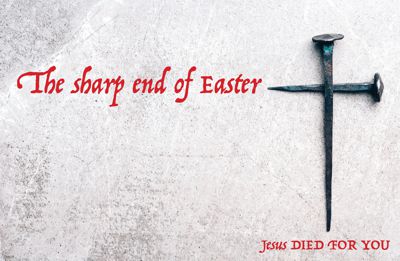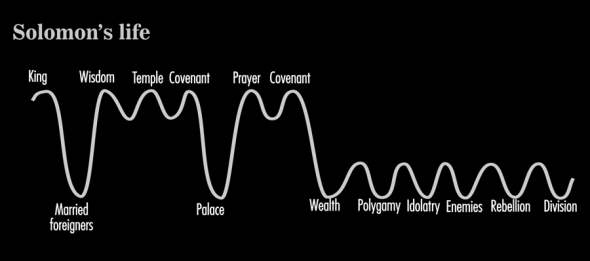God knows everything about you, and still loves you

 How much of yourself do you feel you must filter when you’re with others? Of course, “others” isn’t a single category; there are many types of others in our lives, from our social media contacts to our closest friends or family members. Is there someone whom you feel you can truly be yourself with? Someone with whom you can express your vulnerable feelings, talk about your deepest struggles, and share your worst moments? We humans learn from a very early age that sharing our deepest parts, especially those we may not like, can be uncomfortable. That’s what happens when we see a toddler hide or cover their face when they know they’ve done the wrong thing. Experiencing rejection, condemnation, or exploitation after revealing our vulnerable parts is incredibly emotionally painful. (more…)
How much of yourself do you feel you must filter when you’re with others? Of course, “others” isn’t a single category; there are many types of others in our lives, from our social media contacts to our closest friends or family members. Is there someone whom you feel you can truly be yourself with? Someone with whom you can express your vulnerable feelings, talk about your deepest struggles, and share your worst moments? We humans learn from a very early age that sharing our deepest parts, especially those we may not like, can be uncomfortable. That’s what happens when we see a toddler hide or cover their face when they know they’ve done the wrong thing. Experiencing rejection, condemnation, or exploitation after revealing our vulnerable parts is incredibly emotionally painful. (more…)
The sharp end of Easter

 If I type “Easter” into my phone the emoji of a cute baby chick in an egg shell comes up. At the shops there are pictures of soft fluffy bunnies and mountains of sweet chocolate eggs. Easter ads show cherub-like laughing children running through green gardens, and generations of family members gathering happily around delicious feasts. (more…)
If I type “Easter” into my phone the emoji of a cute baby chick in an egg shell comes up. At the shops there are pictures of soft fluffy bunnies and mountains of sweet chocolate eggs. Easter ads show cherub-like laughing children running through green gardens, and generations of family members gathering happily around delicious feasts. (more…)
Solomon’s hills and valleys

 Solomon was the third king over Israel. He lived in the 10th century BC. There is an account of his life in 1 Kings 1-11 and 1 Chronicles 29:21 to 2 Chronicles 9:31 of the Bible. And Solomon wrote Proverbs, Ecclesiastes, and Song of Songs. The main hills and valleys in his life are shown in the graph. (more…)
Solomon was the third king over Israel. He lived in the 10th century BC. There is an account of his life in 1 Kings 1-11 and 1 Chronicles 29:21 to 2 Chronicles 9:31 of the Bible. And Solomon wrote Proverbs, Ecclesiastes, and Song of Songs. The main hills and valleys in his life are shown in the graph. (more…)
Create in me a clean heart

 What would you think of a man who used his power to forcibly have sex with a woman? But he didn’t stop there. This woman was married and after finding out she’d become pregnant through his sexual assault he tried to make it look like the baby belonged to her husband. When this failed he once again used his power to arrange the husband to be killed. It’s reprehensible behaviour. Unforgivable, many would say. This is the biblical story behind Psalm 51 – the story of king David. (more…)
What would you think of a man who used his power to forcibly have sex with a woman? But he didn’t stop there. This woman was married and after finding out she’d become pregnant through his sexual assault he tried to make it look like the baby belonged to her husband. When this failed he once again used his power to arrange the husband to be killed. It’s reprehensible behaviour. Unforgivable, many would say. This is the biblical story behind Psalm 51 – the story of king David. (more…)
If God is all-loving and all-powerful, why is there suffering in the world?

 We all experience human suffering at one time or another. It may be sickness, injuries, pain, loss, failure, heartache, disappointment, sorrow, tragedy, disasters, crime, evil, disappointment, accusations, betrayal, misunderstanding, persecution, abuse, or death.
We all experience human suffering at one time or another. It may be sickness, injuries, pain, loss, failure, heartache, disappointment, sorrow, tragedy, disasters, crime, evil, disappointment, accusations, betrayal, misunderstanding, persecution, abuse, or death.
Everyone asks this question sometime in their life. What is the purpose of suffering? Suffering is a real challenge to Christians and a hindrance to trusting Christ for salvation. Many Christians feel secure in their faith until something bad happens; then this question becomes painfully relevant. (more…)
Comprehensive outline of the book of Genesis

 The first book of the Old Testament, Genesis, was compiled from eleven older documents by Moses (Appendix A).
The first book of the Old Testament, Genesis, was compiled from eleven older documents by Moses (Appendix A).
I like having titles on the paragraphs or sections of my Bible. This helps to indicate the context of a particular passage of scripture. A comprehensive outline (section headings) of the book of Genesis is given below. (more…)
Todays’ weather brought to you by God

 Tsunamis, floods, and bush fires are no joke. In 2021 it was estimated by Deloitte that natural disasters cost Australia over $38 billion a year and this will nearly double by 2060. The real cost, however, is more than a financial one, many people and animals lose their homes and even their lives when a major disaster strikes.
Tsunamis, floods, and bush fires are no joke. In 2021 it was estimated by Deloitte that natural disasters cost Australia over $38 billion a year and this will nearly double by 2060. The real cost, however, is more than a financial one, many people and animals lose their homes and even their lives when a major disaster strikes.
So what should we think about the weather? Is God really in control? Most of us are comfortable asking God for good weather for our next sports game or outdoor event – we may even thank God for a perfect sunny day. But when it comes to bad weather, who’s to blame – infamous weather systems like El nina or God? And who can we go to about these disasters? (more…)
The Biblical solution for racism

 Racism is discrimination or prejudice against a people group. “People group” includes grouping according to skin color, nationality, citizenship and ethnic or national origins.
Racism is discrimination or prejudice against a people group. “People group” includes grouping according to skin color, nationality, citizenship and ethnic or national origins.
Racism has justified slavery, colonialism, apartheid, forced sterilisations and annihilations of peoples. It has been the basis of the Nazi ideologies and of the programmes to exterminate Jews and other “inferior peoples”. According to Wikipedia, “Racism has played a role in genocides such as the Holocaust, the Armenian genocide, the Rwandan genocide, and the Genocide of Serbs in the Independent State of Croatia, as well as colonial projects including the European colonization of the Americas, Africa, Asia, and the population transfer in the Soviet Union including deportations of indigenous minorities.” (more…)
God saved the Queen

 “God Save the Queen” has been the anthem of Britain for the last 70 years; the phrase used as an expression of patriotism and royal support. But what did the Queen need saving from? Did she need saving from republicanism, from the decline of the Commonwealth, from foreign invasion, or the collapse of her own family? In her own words, Queen Elizabeth II explained she needed saving from something far more insidious and universal than outside enemies. “Although we are capable of great acts of kindness, history teaches us that we sometimes need saving from ourselves—from our recklessness or our greed,” Queen Elizabeth said during her Christmas message in 2011. This remarkable woman, who has since her passing been described as dutiful, faithful, servanthearted, forgiving and stable, recognised that she still needed saving from her own sin. (more…)
“God Save the Queen” has been the anthem of Britain for the last 70 years; the phrase used as an expression of patriotism and royal support. But what did the Queen need saving from? Did she need saving from republicanism, from the decline of the Commonwealth, from foreign invasion, or the collapse of her own family? In her own words, Queen Elizabeth II explained she needed saving from something far more insidious and universal than outside enemies. “Although we are capable of great acts of kindness, history teaches us that we sometimes need saving from ourselves—from our recklessness or our greed,” Queen Elizabeth said during her Christmas message in 2011. This remarkable woman, who has since her passing been described as dutiful, faithful, servanthearted, forgiving and stable, recognised that she still needed saving from her own sin. (more…)
Sin bin Sunday

 Yesterday was called “Sin bin Sunday” by the Sydney news media. Seven players were sent to the sin bin (Appendix) in a game for the first time in Australian Rugby League history. (more…)
Yesterday was called “Sin bin Sunday” by the Sydney news media. Seven players were sent to the sin bin (Appendix) in a game for the first time in Australian Rugby League history. (more…)
A warning about the Lord’s Supper


The warning signs of a heart attack include chest pains or tightness, discomfort in other areas of the upper body, shortness of breath, sweating, fatigue, lightheadedness, indigestion, nausea, and vomiting. If you think you are having a heart attack, someone should call emergency services immediately. Did you know that there is also a warning in the Bible about the Lord’s Supper? (more…)
Are you protected?

 The older I get the more I understand how fragile human life really is. The COVID-19 pandemic is just one example of how something seemingly small can change the lives of the entire world’s population. As advanced, intelligent and resilient as humanity is, life can be lost in the blink of an eye. For this reason we spend a lot of effort trying to protect ourselves and our loved ones… from buckling the back-arching, screaming toddler into her seatbelt, to spending hard earned cash on insurance policies, to getting the COVID jab. (more…)
The older I get the more I understand how fragile human life really is. The COVID-19 pandemic is just one example of how something seemingly small can change the lives of the entire world’s population. As advanced, intelligent and resilient as humanity is, life can be lost in the blink of an eye. For this reason we spend a lot of effort trying to protect ourselves and our loved ones… from buckling the back-arching, screaming toddler into her seatbelt, to spending hard earned cash on insurance policies, to getting the COVID jab. (more…)
The gospel in one Bible verse

 Joe lives alone and has little contact with his family. He has no carer and needs help to look after his home, garden, health and safety. And he has been socially isolated during the 3-month lockdown in Sydney during the COVID pandemic. Like all of us, his days on earth are numbered. But being over 90 years of age, his number of days is less than most of us.
Joe lives alone and has little contact with his family. He has no carer and needs help to look after his home, garden, health and safety. And he has been socially isolated during the 3-month lockdown in Sydney during the COVID pandemic. Like all of us, his days on earth are numbered. But being over 90 years of age, his number of days is less than most of us.
Joe is a nominal Roman Catholic who needs to hear the good news about Jesus – the Bible says that Jesus took our place before God by dying on the cross for us so that we can be forgiven and have a new relationship with God. Here’s an easy way to share the gospel with someone like Joe. (more…)
Making sin look normal

 German women’s hockey captain Nike Lorenz wore a rainbow-colored band on her socks at Tokyo 2020 after the International Olympic Committee (IOC) agreed to let her support the Lesbian, Gay, Bisexual and Transgender movement and sexual diversity.
German women’s hockey captain Nike Lorenz wore a rainbow-colored band on her socks at Tokyo 2020 after the International Olympic Committee (IOC) agreed to let her support the Lesbian, Gay, Bisexual and Transgender movement and sexual diversity.
The sexual revolution in the 1960s to the 1980s increased acceptance of sexual relationships outside heterosexual marriage. Since then, mass media, birth control and legalization of abortion have fuelled premarital sex, cohabitation and extramarital sex. And our “permissive society” and the internet have normalized pornography. Sexual relationships outside heterosexual marriage are now lawful in the Western world because of the rights of liberty and privacy. (more…)
The dangers of theistic evolution

 The foundations of a building can move and crack due to expansive soils such as clay, poor soil compaction, plumbing leaks, poor drainage, or tree roots. Did you know that the theory of biological evolution destroys the foundation of the Christian gospel?
The foundations of a building can move and crack due to expansive soils such as clay, poor soil compaction, plumbing leaks, poor drainage, or tree roots. Did you know that the theory of biological evolution destroys the foundation of the Christian gospel?
This post is based on a presentation by Dr Mark Harwood of Creation Ministries International (CMI). (more…)
Crown of thorns

 Who’s been watching the Olympic games in Tokyo where athletes are striving to win a gold medal? In the ancient games the winner received a laurel wreath to place on their head. The wreath was a symbol of victory. The Greek god Apollo wore such a wreath. And Julius Caesar wore a wreath to show his power. So, the laurel wreath was an ancient symbol of victory and success. (more…)
Who’s been watching the Olympic games in Tokyo where athletes are striving to win a gold medal? In the ancient games the winner received a laurel wreath to place on their head. The wreath was a symbol of victory. The Greek god Apollo wore such a wreath. And Julius Caesar wore a wreath to show his power. So, the laurel wreath was an ancient symbol of victory and success. (more…)
Sanitize more than hands
 How clean do you keep your hands? Hand hygiene has certainly gotten a lot of attention lately. It reminds me of one of my favorite Shakespearean scenes — Lady Macbeth is sleepwalking after she has orchestrated the murder of her king. In her sleep she sees spots of blood on her hands and no amount of washing can remove them. She smells blood on her hands and “all the perfumes of Arabia will not sweeten” them. Of course it is her conscience and not her hands that is really unclean. (more…)
How clean do you keep your hands? Hand hygiene has certainly gotten a lot of attention lately. It reminds me of one of my favorite Shakespearean scenes — Lady Macbeth is sleepwalking after she has orchestrated the murder of her king. In her sleep she sees spots of blood on her hands and no amount of washing can remove them. She smells blood on her hands and “all the perfumes of Arabia will not sweeten” them. Of course it is her conscience and not her hands that is really unclean. (more…)
Imagine someone knowing everything about you!

 Do you know you’re not the only one? We all have parts of ourselves we’d rather no one else knew about. Parts we may try to hide from even ourselves, to distract ourselves from with busyness or entertainment, to overcompensate for with gifts or acts of service. But they are there. Whether it’s memories of what we’ve done or what has been done to us, ugly thoughts and feelings we can’t bear to look in the face, the way we treat our family when no one else is around, secret addictions we believe render us unlovable… Oh they are there and they want to remain hidden in the dark where no one can see and judge them. (more…)
Do you know you’re not the only one? We all have parts of ourselves we’d rather no one else knew about. Parts we may try to hide from even ourselves, to distract ourselves from with busyness or entertainment, to overcompensate for with gifts or acts of service. But they are there. Whether it’s memories of what we’ve done or what has been done to us, ugly thoughts and feelings we can’t bear to look in the face, the way we treat our family when no one else is around, secret addictions we believe render us unlovable… Oh they are there and they want to remain hidden in the dark where no one can see and judge them. (more…)
What does the Bible say about a major disaster like COVID-19?

 The disease COVID-19 is spreading rapidly across the world. By 11 April 2020 over 103,500 deaths have been attributed to the virus and secondary pneumonia.
The disease COVID-19 is spreading rapidly across the world. By 11 April 2020 over 103,500 deaths have been attributed to the virus and secondary pneumonia.
What does the Bible say about a global pandemic like COVID-19?
This post is based on an article by the US theologian and author, John Piper. (more…)
A major problem
 Last week I climbed Uluru (Ayers Rock) in central Australia. On the way down there was a man who became very unwell around 3/4 of the way up the climb chain. He was being assisted by two off-duty police officers and two off-duty paramedics. This turned into a major problem when he suffered a heart attack. They performed CPR and used a defibrillator to shock his heart back into a survivable rhythm, saving his life. A few hours later the man was carefully moved down the steep face of the rock on a stretcher using ropes and pulleys. He was treated at Yulara Health Centre before being flown to Alice Springs Hospital by the Royal Flying Doctor Service, and then to Adelaide for specialist heart surgery.
Last week I climbed Uluru (Ayers Rock) in central Australia. On the way down there was a man who became very unwell around 3/4 of the way up the climb chain. He was being assisted by two off-duty police officers and two off-duty paramedics. This turned into a major problem when he suffered a heart attack. They performed CPR and used a defibrillator to shock his heart back into a survivable rhythm, saving his life. A few hours later the man was carefully moved down the steep face of the rock on a stretcher using ropes and pulleys. He was treated at Yulara Health Centre before being flown to Alice Springs Hospital by the Royal Flying Doctor Service, and then to Adelaide for specialist heart surgery.
 This post looks at a major problem faced by a commander in the Syrian army, which is described in the Bible. We will see from this that God can deliver us from our major problem.
This post looks at a major problem faced by a commander in the Syrian army, which is described in the Bible. We will see from this that God can deliver us from our major problem.
Text
Naaman’s problem is described in 2 Kings 5:1-15 (NIV):
1 Now Naaman was commander of the army of the king of Aram [Syria]. He was a great man in the sight of his master and highly regarded, because through him the Lord had given victory to Aram. He was a valiant soldier, but he had leprosy. (more…)
Sin is not as much fun as you think

 Why do we sin? Because it’s a chore – of course not! Actually, we do the wrong thing because it’s fun, satisfying or seems too difficult to resist. Why would we bother if it weren’t any of those things? Lowering the car window and letting rip at the stupid person blocking our way… how good did that feel? Revealing that choice morsel of information … everyone in the office deserves to know what happened! Mostly, our sin reveals a lot about the kind of person we really are.
Why do we sin? Because it’s a chore – of course not! Actually, we do the wrong thing because it’s fun, satisfying or seems too difficult to resist. Why would we bother if it weren’t any of those things? Lowering the car window and letting rip at the stupid person blocking our way… how good did that feel? Revealing that choice morsel of information … everyone in the office deserves to know what happened! Mostly, our sin reveals a lot about the kind of person we really are.
Some years back a newspaper article named seven high profile males (mostly politicians) found to be adulterers. Collectively they had fathered 24 children. The article pondered the damage caused to those 24 lives and the sad ending to public careers. (more…)
Good times ahead

 Freedom from the presence of sin
Freedom from the presence of sin
Do you look forward to good times on weekends and vacations? It’s relaxing to get away from the pressures of life. John Bunyan likened the Christian life to a journey which he called “The Pilgrim’s Progress” (Appendix A and B). The journey begins with justification (deliverance from the penalty of sin), continues with sanctification (deliverance from the power of sin) and ends with glorification (deliverance from the presence of sin). (more…)
Steps to peace with God

 The Bible tells us how to overcome the obstacles that prevent us from being reconciled with God. First, we need to recognize God’s purpose for us.
The Bible tells us how to overcome the obstacles that prevent us from being reconciled with God. First, we need to recognize God’s purpose for us.
God’s purpose for us is peace and life
God loves you and wants you to experience peace and life – abundant and eternal.
The Bible says:
– “We have peace with God because of what Jesus Christ our Lord has done for us” (Rom. 5:1NLT).
– “This is how God loved the world: He gave His one and only Son, so that everyone who believes in Him will not perish but have eternal life” (Jn. 3:16).
– “My purpose is to give them [people] a rich and satisfying life” (Jn. 10:10).
So we need to recognize that God’s purpose for us is peace and life. Why don’t most people have this peace and abundant life that God planned for us to have? Because there is an obstacle or barrier in the way. In order to remove the obstacle or barrier, we need to realize our greatest problem. (more…)



 Some of my grandchildren do an Obstacles Course as an after-school activity. And we face many obstacles in life. Today we are looking at the most important obstacles in our lives. These are the ones that come between us and God. This post is based on a message given in Sydney, Australia, by Franklin Graham in February 2019.
Some of my grandchildren do an Obstacles Course as an after-school activity. And we face many obstacles in life. Today we are looking at the most important obstacles in our lives. These are the ones that come between us and God. This post is based on a message given in Sydney, Australia, by Franklin Graham in February 2019.



RECENT COMMENTS